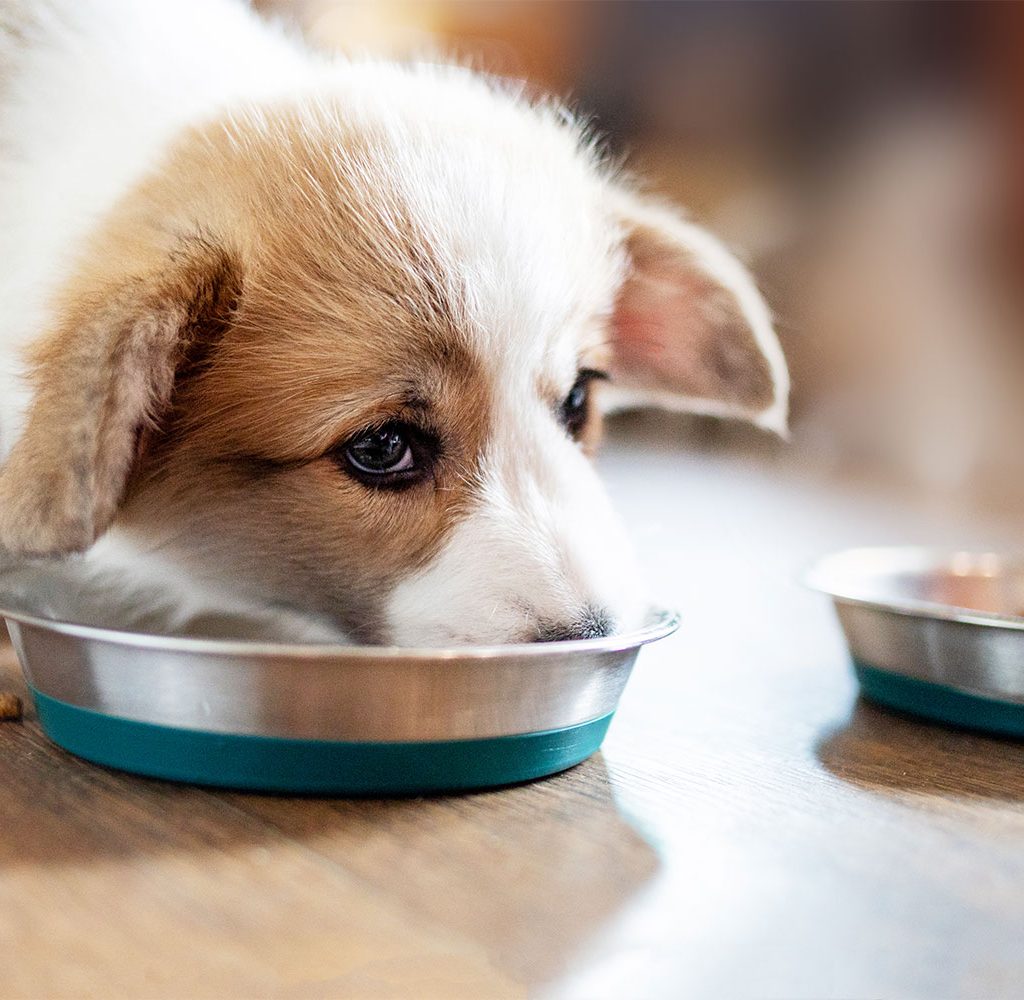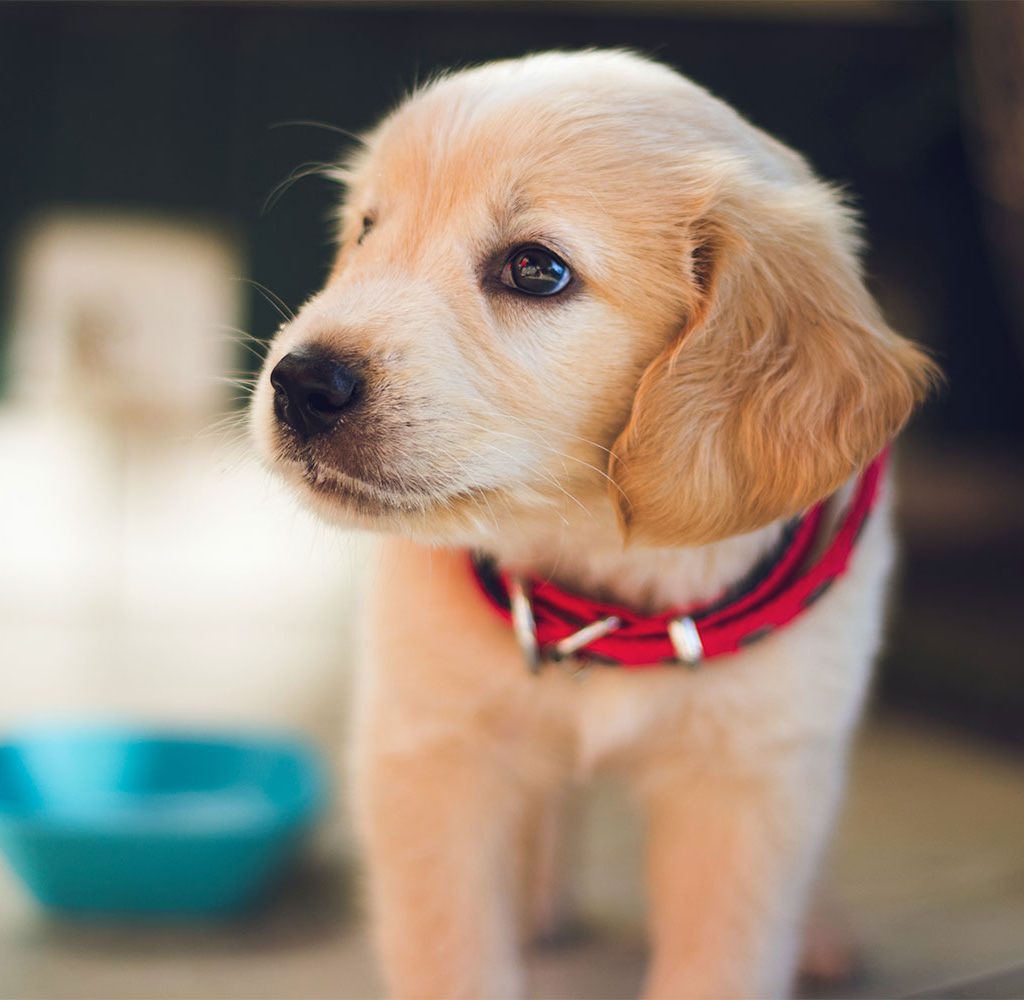Puppies have their own needs, and those may be different from the adult dogs in your life. One big difference between raising puppies and caring for adult dogs is nutrition. While puppies won’t starve on regular dog food, they thrive with a diet formulated for their specific nutrition needs.
When you get a puppy, you’ll need to be ready to make changes frequently as your puppy grows. Eventually, puppies transition into adulthood, and as they do, they will need to switch to adult dog food. Understandably, it can be hard to know when to make the official switch. Let’s take a deep dive into your puppy’s nutrition to untangle myth from fact. In the meantime, you can also learn when will your puppy sleep through the night.

Puppy nutrition basics
Puppies experience rapid growth, so they’ll require more nutrients than their adult counterparts. Puppy foods are designed to meet these caloric requirements without adding additional calories that could cause puppies to grow too quickly.
For large breed puppies, this is especially important. Growing too quickly can put stress on delicate joints and set up your large breed puppy for musculoskeletal issues for years. The right food handles nutrition in a safe and healthy proportion.
Puppies will need multiple meals per day to help stabilize energy and blood sugar. They’ll slowly transition to one to two meals per day as they get older.
Puppy food is too nutritionally dense for an adult dog and could cause weight problems if you don’t change over when the time is right. Talking to your vet will help you keep abreast of these changes and make the best decisions for health.
Feeding your dog through the first year
Once your puppy is weaned, dietary changes will happen often. Stay flexible and keep an open line of communication with your veterinarian to ensure proper feeding habits.
- 6-12 weeks — Puppies this young have just weaned successfully and are ready to receive nutrition solely from dog food. Puppies may need three to four feedings per day to help stabilize energy levels and should slowly transition from moistened food to regular food by 10 or so weeks for large breeds and 14 or so weeks for small breeds.
- 3-6 months — Puppies are beginning to lose their puppy bellies during this period, and your veterinarian may recommend reducing feedings by one if appropriate. It’s essential to watch your puppy’s weight to ensure growth doesn’t happen too quickly.
- 6-12 months — Your puppy is transitioning to fewer feedings and becoming closer to its adult weight and body. Once your puppy reaches around 75% of its expected adult weight, your veterinarian may suggest transitioning to adult food for good.
How to transition from one food to another
- Not all dogs have problems changing foods, but for those picky eaters or those with sensitive tummies, you may have to transition slowly.
- When it’s time to transition to a new food, take a small amount of the new food and mix with a portion of the old food. Allow your dog to eat as usual.
- Add a little more of the new food to the portion and continue feeding your dog as usual.
Continue to switch portions, reducing the old food, and increasing the new food until it’s all the new food. - From now on, feed only the new food.
- Throughout the process, watch for signs of distress or tummy issues and ease the amount of new food to give your puppy time to adjust.
- If you continue to have issues with your puppy’s eating, address these issues with your veterinarian to find a solution.

How often should I feed my puppy?
Puppies will need to eat more than once a day, but the number of feedings will depend on your puppy. Take the daily recommended serving and divide it into three or four feedings per day, depending on what your veterinarian suggests.
The idea is to gradually reduce these feedings until your puppy becomes an adult and can maintain energy levels for longer. As an adult, your dog will only need one to two meals per day.
Should I buy expensive food?
While price shouldn’t be your only consideration, many higher-end foods have more dense nutrition contents, allowing you to feed your puppy less without sacrificing nutrition. Check with your vet to find a food that balances your budget with your puppy’s nutritional needs.
Should I feed wet or dry food?
Wet food is a great way to help your puppy transition from milk to standard dog foods, and dry food is easier to store. Whether you decide to serve wet or dry food or a combination of both will depend on your puppy’s preferences.
You may want to start with wet food and transition to dry food by feeding moistened dry food in the same transition method we suggested above. As long as your puppy is eating regularly, you’re fine.
Your puppy’s health in the first year
Your veterinarian is a wealth of information for when to stop feeding puppy food. You can decide when to switch to adult food together, depending on how your puppy grows and what’s best for your lifestyle as a pet owner.
Your puppy’s growth during the first year is an essential part of establishing a lifetime of health and well-being. It’s necessary to establish good habits so that your puppy can thrive.


